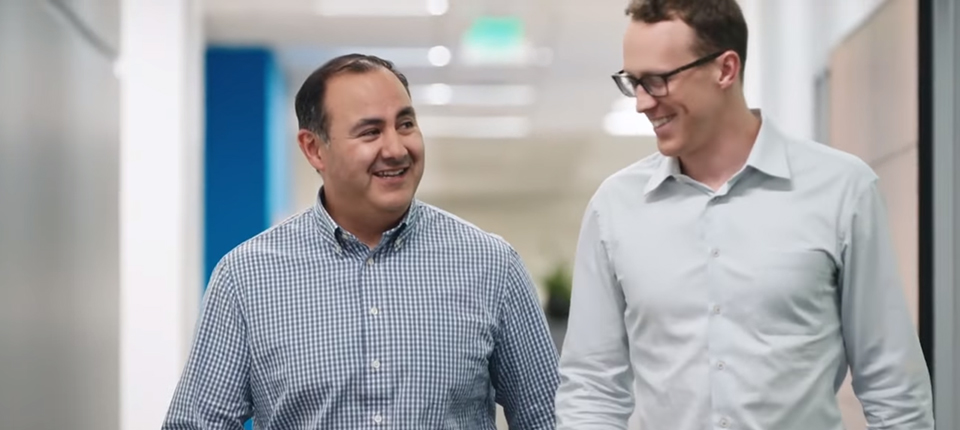
Confirm RX™ ICM: Smarter Heart Monitoring
Abbott's Alex Soriano and Micah Meulmester supported a scientific breakthrough to change technology — and patients' lives.
Changing lives | Sep. 11, 2019
- Copy Link
- Share on X
- Share on Facebook
- Share on Linkedin
In the day of an electrophysiologist — a cardiologist who specializes in the electricity of the heart — there is one distressing scenario that presents itself all too often. A patient with symptoms of an irregular heartbeat, the feeling that the heart is racing, and perhaps dizziness, shortness of breath or fainting. Numerous tests are run, but the results are inconclusive.
Before Abbott developed Confirm Rx™ ICM, an insertable cardiac monitor that links to patients' smartphones to provide real-time recording of the heart rhythm, physicians didn't have many favorable options when confronted with this dilemma. They could have the patient monitor symptoms on their own with a limited wearable device, such as a traditional EKG monitor, which can be burdensome for the patient to wear and time-consuming for the physician to obtain and interpret results, in part due to a lack of smartphone connectivity.
Abbott moved to tackle this challenge head-on from the outset: What was a better monitoring solution? What could be less intrusive, and a better use of technology allowing doctors to glean a real-time understanding of a patient's abnormal heart rhythms and potentially identify the cause of symptoms?
Finding answers to big questions
Working together, Abbott's teams found the answers, manufacturing a device that utilized new technology and would be a feasible option for thousands of patients.
Micah Meulmester, senior manager of device operations in Abbott's Cardiac Rhythm Management (CRM) business, is charged with turning Abbott engineers' designs into reality through the manufacturing process. He still marvels at the size of the Confirm Rx ICM device to this day. The implanted device is 3.1 millimeters thick or a little less than two U.S. quarters stacked together.
"Size is one of the things that's very important to our customers because their patients don't really want to know that it's there," Meulmester says of the device. "Because of its discreet size and smartphone connectivity, it's something that patients don't have to act on or worry about. The challenge for our engineers is how do you make a cost-effective product while also pushing the boundaries of technology?"
Meulmester remembers confronting those challenges in bringing Confirm Rx ICM to life — he and the team of engineers helped implement a design that was a first for implantable cardiac monitors: the ability to communicate with a patient's smartphone with Bluetooth® wireless technology. It was an important innovation to understand packaging and manufacturing the technology in such a small device while also protecting the electronics from the body's fluids and harsh internal environment.
Alex Soriano, director of mechanical development and material science in Abbott's CRM business, supported delivering that intelligent design along with cross functional engineering disciplines including systems, electrical, clinical, software, firmware, and program management. Soriano supported getting after the big issues: how to solve a problem that was vexing electrophysiologists and create a design that would work for both patients and doctors, providing a less intrusive procedure and help ensure patients are always connected.
It's one of the things Soriano loves about Abbott. "It's these types of problems that I've found fascinating, and there's a significant amount of unmet clinical need," Soriano says of Confirm Rx ICM. "I've always had an interest in wanting to improve patients' lives and do it with engineering principles."
Working smart
Both Meulmester and Soriano came prepared for the challenges that development presented. It wasn't just their background in biomedical engineering, and medical devices that set them up to succeed, but also the way that Abbott had taught them to think about big problems.
Abbott has a rigorous process to test ideas and assumptions as part of formal design reviews. "You've really have to come in well prepared and expect feedback." Soriano says. Though, he also adds that the company's open and collaborative environment is one of the best things about working at Abbott. "I love my job," Soriano says. "Working here and the type of engineering problems that we tackle — it's a lot of fun. The interaction with the engineers is a blast. We take the work incredibly seriously, but we also have fun."
The collaborative atmosphere leads to breakthroughs, and it means that no engineer feels like they must know everything to solve any given problem.
Still, Soriano likes to push new hires and young engineers to think about "life cycle." A common issue he's observed is that engineers will start tackling a problem that doesn't need to be solved yet — or they'll go back and rework something that's finished. According to Soriano, the great engineer finds their sweet spot by employing tools they've mastered at just the right time to solve the most pressing issues.
That theme — being unafraid to use lessons learned from different disciplines at the right moment — is something Soriano often discusses with his teenage daughter when talking about her potential career paths.
He says, "The successful engineers have the ability to leverage all the tools they've learned in their formal training and know when to pull the tool up and when to master it. The fundamentals across all engineering disciplines... and having the courage to apply it, that shift — you were taught this! Use it."
™ Indicates a trademark of the Abbott group of companies.
Bluetooth and Bluetooth logo are registered trademarks of Bluetooth SIG, Inc.
© 2019 Abbott. All Rights Reserved.